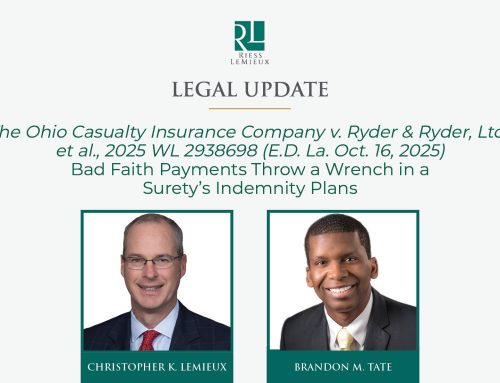 Contractual Duties and Construction Site Safety – Court’s Differential Rulings in Bonilla concerning the Duty Owed by an Engineering Consultant.
Contractual Duties and Construction Site Safety – Court’s Differential Rulings in Bonilla concerning the Duty Owed by an Engineering Consultant.
Authors: Jon Forester and Jennifer Mura
Bonilla v. Verges Rome Architects, 2022–CA-0802, 2023 WL 3371562 (La. App. 4 Cir. 5/11/23), — So.3d —-.
The Fourth Circuit issued a contrasting opinion regarding the duty owed by an engineering consultant compared to the architect in Bonilla v. Verges Rome Architects. While the Court found questions of fact regarding the potential awareness and duty of the architect, Verges Rome Architects (“VRA”), as addressed in our previous post, the Court affirmed summary judgment in favor of the engineer consultant for the project, Morphy Makofsky, Inc. (“MMI”) finding no duty was owed to the injured worker.
Gustavo Bonilla was injured performing demolition work for a subcontractor on a renovation project for the City of New Orleans. Mr. Bonilla was demolishing a vault with a hydraulic jackhammer on the vault’s concrete ceiling when the vault collapsed. Mr. Bonilla filed suit against VRA and MMI, alleging negligence in the design plans and failure to supervise the execution of the plans for safety. VRA and MMI filed motions for summary judgment, arguing they did not owe a duty to supervise the safety of the construction site based on the relevant contracts. The trial court granted the summary judgments and Mr. Bonilla appealed.
The Court found the evidence and arguments submitted by Mr. Bonilla conflated the roles and duties of MMI and VRA. The evidence consisted of two expert reports, deposition testimony, and photographs taken by Mr. Taffaro, an architect for VRA showing the condition of the site during the demolition. The court emphasized that Mr. Taffaro’s site visit and observations as a VRA representative could not be imputed to MMI. The Court also noted that neither of the expert reports submitted by Mr. Bonilla specifically addressed any negligence or breach of duty by MMI.
The Court relied on the express provisions of the contract which clearly stated the contractor was responsible for the means and methods of worksite safety. MMI’s role was limited to specific consultant work which did not include involvement in the demolition of the vault or overall site safety.
Thus, the Court found that MMI did not owe a duty to ensure Mr. Bonilla’s safety or supervise the construction site beyond its specified scope of work as a consultant for VRA. The Court found no evidence that MMI was aware of any unsafe conditions or the demolition process as MMI had not visited the site until a month after the accident.
The Court’s differential rulings in this case highlight the significance of contract interpretation in defining the precise roles and obligations of design professionals, such as architects and engineers. Importantly, the Court’s focus on the potential awareness and knowledge possessed by each party sheds light on the impact these factors can have on determining the duty owed by design professionals with regard to construction site safety.



